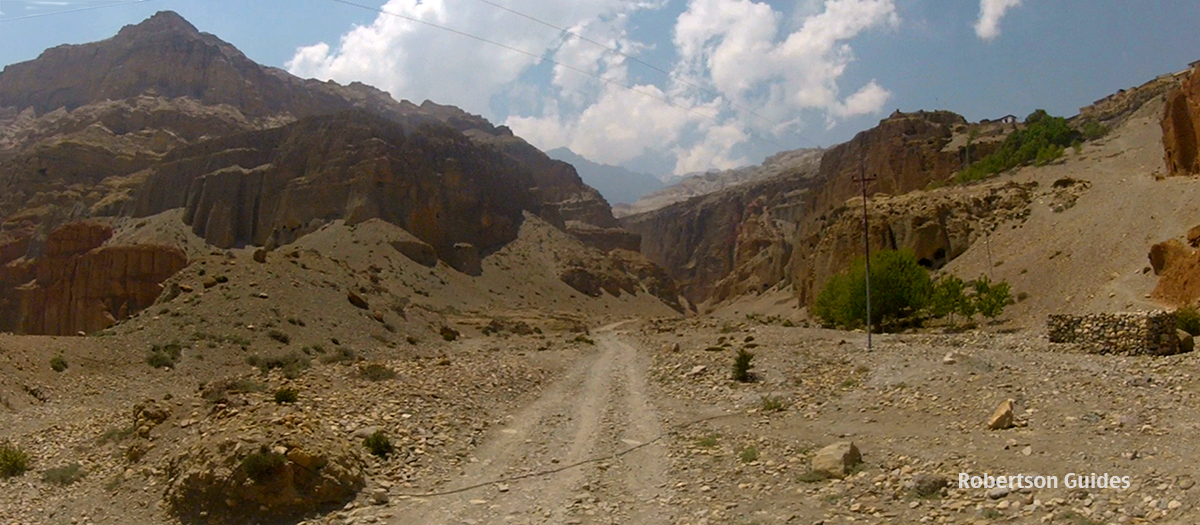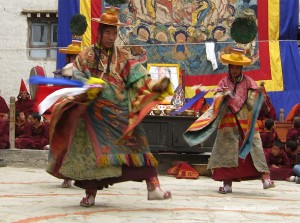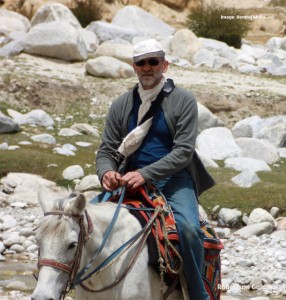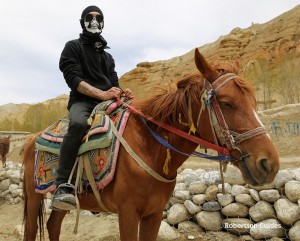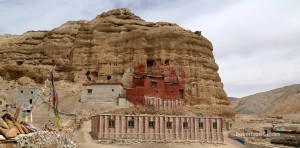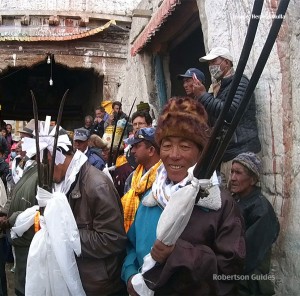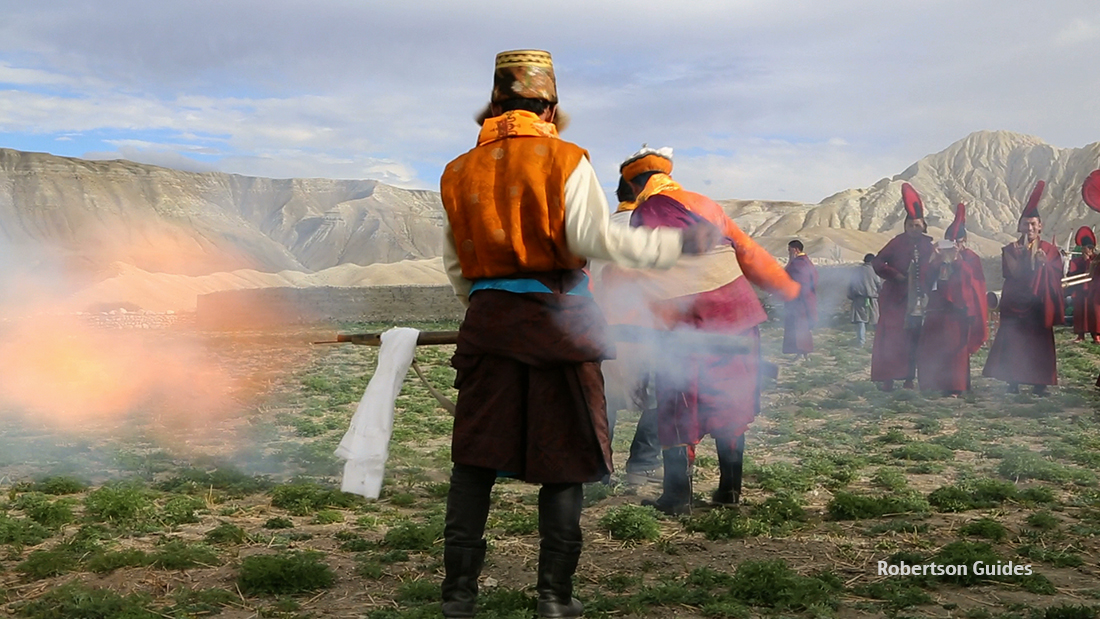“If you want to come somewhere really on the edge, why don’t you come to Upper Mustang with me?” said Raj – well something like that and, of course, after the third or fourth glass of red wine I was up for it!
So, with our guide Hemraj, we three ( that’s Raj, Cameron and me) traveled from Jomsom by jeep up the Kali Gandaki gorge to Upper Mustang and the Kingdom of Lo.
Now, that trip was something else! More a four wheel drive test track than a road as it wound up the deepest gorge on earth (yep – makes the Grand Canyon look like drainage ditch) higher and higher to reach Lo Manthang at nearly 4,000 metres.
We had come to see the yearly Tiji Festival – a Buddhist ritual over three days which has been celebrated in Lo Manthang for hundreds of years.
Now Raj was right – this place is really on the edge of the modern world. It was only opened to visitors in 1992 and even now only about 3,000 tourists visit per year and that really only in the warmer months. I say warmer rather than warm because even in summer, once the sun has set the temperature drops rapidly and gets cold enough for what little moisture there is in the air to drop out as snow crystals only to be buffeted by the constant cold wind from the south. With the wind, the dust, the cold, the glare and the elevation, this is probably the most challenging environment I have ever experienced – and that’s summer!
I have lots to say about the Tiji ceremony, but now, I want to tell you about the last day – day three.
We were lucky enough to score a homestay with Mr Gumbo and Mrs Yutin Gurungs and Mr Gumbo had a team of ponies. So, in the morning of day three we decided to ride up to Chosser to see some temples and to get out of town to soak up the atmosphere.
I expected that Mr Gumbo would ride with us, but instead he walked alongside his team of horses constantly talking, singing and whistling to them. The horses were his team. They listened to his instructions and got annoyed if we tried to do anything Mr Gumbo had not told them to do. Rather than riding them, we found it easier just to sit there and let Mr Gumbo call the shots. Besides, we had enough to do just to open our eyes and drink in the astounding topography of the high Himalayas.
The most extraordinary thing was the light. I must admit I am struggling to find a way of describing it. At these elevations, nearly half the atmosphere is below us – making the light unfiltered. It’s so white! And it is so direct.
The one patch of skin that Cameron left bare, just above his goggles and below his cap, soon turned bronze – but a colour he never goes. In fact, when we examined our skins there was a redness to them that I have never seen – before or since.
Cameron’s bronze bit didn’t last, in fact it rolled off within a day or so but without leaving sunburn – strange….
So we sat on the colourful rugs that covered our saddles and soon the constant tinkling of the ponies’ bells faded from our consciousness.
When you are in an environment so different it’s like another world (Alice through the Looking Glass stuff), where your eyes focus not on the car bumper in front but on the mountains and valleys in the far distance. Your mind relaxes and becomes still. Perhaps it has something it do with the lack of oxygen (we learnt not to start a long sentence), or the light, or the tinkling of the bells or Mr Gumbo’s singing, but time seemed to pass us by – and then we arrived.
Leaving the horses we set off through the barren landscape to see the local temples and this is where the plans went astray.
For the last couple of years I have traveled with a small Cannon camera (the S100 for those who care). Not an expensive camera but one with which I could take a decent picture and it shot 1080p video. I either put it down somewhere or missed my bag putting it away. I retraced my steps numerous times (which required me going up and down a steep stair) but could not find it – some-one probably saw it and carried it away. Anyway, by the time I called the search off we were running late and needed to return to Lo Manthang to catch the finale of the Tiji Festival – and I’m glad we did.
As we dropped our things back at our lodgings we could hear the signature noise of Day Three – the loud explosions from ancient muskets. Hem was ready first and left before us and thank goodness because he made it to the square in time to leave with the monks, musicians, dancers and gunmen. We were caught in the crowd but as the procession left we took a chance and spying some likely lads scurrying off in a different direction through the fields, we gave chase – and it paid off.
We arrived in the field just as the monks were setting up and the musicians were placing their massive trumpets on timber stands. As the monks began their ritual, the group of gunmen arrived, distinctive in their fur lined hats and golden scarves – not to mention the great muzzle loading muskets they carried.
At a certain point in the proceedings, they moved to one side and as they touched lit tapers to the black powder in the breach of each weapon the guns went off with a big bang and a huge puff of blue grey smoke.
The setting was extraordinary. While the field in which we stood was in shade, in the far distance the naked mountains were in bright white light. The land at the edge of the filed dropped away and so there was no middle ground – just our field and the distant mountains.
The dancers in animal masks danced and waved their swords. They also took charge of the crowd and their crowd control was intense – but very effective.
Again and again, the big old guns boomed as the monks chanted and killed off demons. The crowd groaned at the misfires and cheered when the guns boomed but as the sun dipped, the ceremony came to an end and the monks lead the way back to the shelter of the town’s walls.
